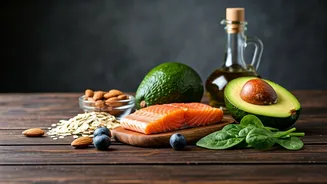HDL Cholesterol Explained
HDL cholesterol is a beneficial type of lipoprotein, often hailed as "good" cholesterol. It plays a critical role in cardiovascular health. HDL particles
work to remove other forms of cholesterol from the arteries, transporting it back to the liver where it can be processed and eliminated. High levels of HDL are associated with a reduced risk of heart disease and stroke, highlighting its protective nature. Maintaining adequate HDL levels is therefore a key aspect of preventing the buildup of plaque in arteries, which can lead to various cardiovascular issues. Furthermore, HDL possesses anti-inflammatory and antioxidant properties, which help to protect against arterial damage, thereby reducing the chances of heart disease and enhancing overall cardiovascular function. This crucial role makes understanding and managing HDL levels essential for a proactive approach to heart health.
Fatty Fish Powerhouse
Fatty fish, such as salmon, mackerel, and sardines, are rich in omega-3 fatty acids, which significantly boost HDL cholesterol levels. These essential fats have multiple health benefits, with a strong impact on cardiovascular health. Omega-3s work to decrease triglycerides, a type of fat in the blood that can contribute to heart disease, while simultaneously raising HDL cholesterol. Studies have consistently shown that incorporating fatty fish into your diet improves heart health, potentially reducing the risk of heart attacks and strokes. Eating fatty fish regularly can improve arterial health and prevent the buildup of plaque, further contributing to a healthier heart. Aim to consume fatty fish at least twice a week to maximize these benefits. Consider various preparation methods like baking, grilling, or steaming to maintain the fish's nutritional value and enjoy a balanced diet that supports your heart.
Olive Oil's Impact
Extra virgin olive oil, a staple in the Mediterranean diet, is linked to numerous health benefits, with a notable effect on HDL cholesterol. Olive oil is rich in monounsaturated fats, which are known to raise HDL levels. It also contains antioxidants that protect the heart by reducing inflammation and preventing oxidative stress. Regular consumption of olive oil can help improve overall cholesterol profiles, contributing to lower levels of bad cholesterol, LDL, and triglycerides. Using olive oil in cooking, drizzling it over salads, or incorporating it into your daily routine can provide a simple way to promote heart health. It's best to opt for extra virgin olive oil, as it retains the highest levels of beneficial compounds, making it a valuable addition to any heart-healthy diet. Olive oil's role in the Mediterranean diet demonstrates its long-term benefits in preventing heart disease and promoting overall well-being.
Avocados and HDL
Avocados are packed with monounsaturated fats, similar to olive oil, making them a great choice for heart health and boosting HDL cholesterol. These creamy fruits provide a good source of healthy fats. They also contain fiber and other nutrients that aid in maintaining a balanced cholesterol profile. The consumption of avocados helps reduce LDL cholesterol, often called "bad" cholesterol, and triglycerides, while increasing HDL levels. This overall effect contributes to a lower risk of heart disease. Integrating avocados into your diet can be easy; add them to salads, sandwiches, or smoothies. Their versatility and delicious taste make them a great option for supporting heart health. They also provide essential vitamins and minerals, such as potassium, contributing to better overall health and disease prevention.
Nuts and Seeds
Nuts and seeds, including almonds, walnuts, flaxseeds, and chia seeds, are excellent sources of healthy fats, fiber, and various nutrients that can enhance HDL cholesterol levels. These foods are a good source of both monounsaturated and polyunsaturated fats. Eating nuts and seeds helps lower LDL cholesterol and triglycerides. Regular consumption promotes heart health. For instance, almonds are rich in vitamin E, which acts as an antioxidant. Walnuts provide omega-3 fatty acids, and flaxseeds and chia seeds offer abundant fiber. Incorporating a handful of nuts and seeds into your diet daily, either as a snack, in salads, or as part of a meal, can be beneficial. Be mindful of portion sizes, as nuts and seeds are calorie-dense. Using them in moderation, however, allows you to reap the benefits of healthy fats and nutrients to boost your HDL and improve overall cardiovascular health.
Whole Grains Benefits
Switching to whole grains from refined grains can improve your HDL cholesterol and overall heart health. Whole grains contain fiber, which helps reduce LDL cholesterol and improve your overall cholesterol profile. This includes foods like oats, brown rice, quinoa, and whole-wheat bread. These foods provide essential nutrients, which is better than processed options. Fiber helps in removing cholesterol from the body. Consuming whole grains aids in stabilizing blood sugar levels, reducing the risk of insulin resistance, which can contribute to heart disease. Including whole grains in your daily meals is easy; substitute white rice with brown rice, or add oats to your breakfast. These choices can contribute to a heart-healthy diet by improving cholesterol levels, reducing the risk of cardiovascular diseases, and promoting overall well-being. Look for products that clearly state 'whole grain' on their labels.
Legumes: Dietary Allies
Legumes such as beans, lentils, and peas can have a positive effect on HDL cholesterol levels. These foods are rich in soluble fiber. They help in lowering LDL cholesterol and triglycerides. These also help in raising HDL levels. The soluble fiber found in legumes binds with cholesterol in the digestive tract. This helps the body remove it. Legumes are a good source of protein and other nutrients, such as folate and magnesium. They are great for heart health. Regular consumption of legumes can contribute to the overall health of your cardiovascular system. Adding legumes to your diet is simple. They can be added to soups, stews, salads, or served as a side dish. These are great and healthy options to incorporate into your meals regularly. Legumes not only improve cholesterol profiles but also offer other health benefits, enhancing the value of the heart-healthy diet.













